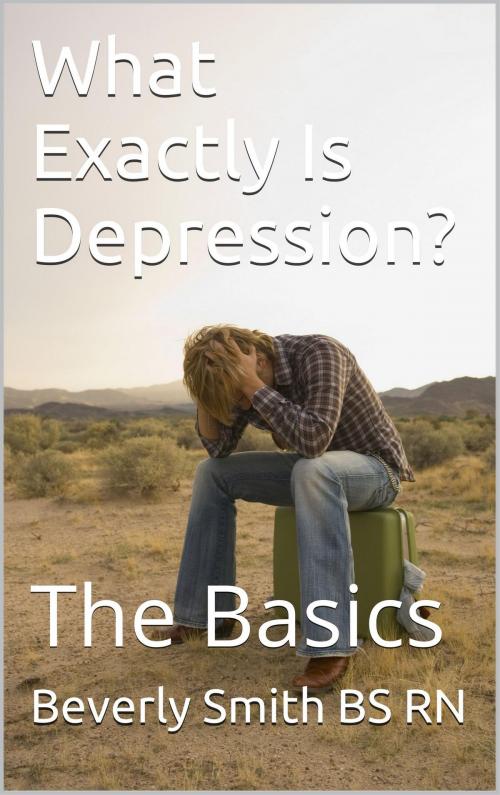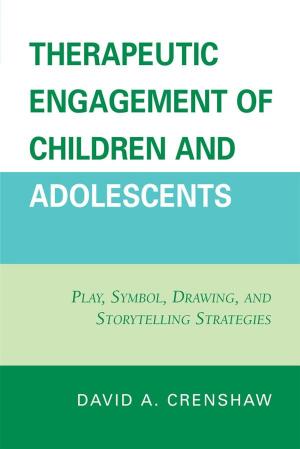What Exactly Is Depression? The Basics
Nonfiction, Health & Well Being, Medical, Ailments & Diseases, Mental Health, Psychology| Author: | B. A. (Beverly) Smith | ISBN: | 9781311653604 |
| Publisher: | B. A. (Beverly) Smith | Publication: | May 12, 2014 |
| Imprint: | Smashwords Edition | Language: | English |
| Author: | B. A. (Beverly) Smith |
| ISBN: | 9781311653604 |
| Publisher: | B. A. (Beverly) Smith |
| Publication: | May 12, 2014 |
| Imprint: | Smashwords Edition |
| Language: | English |
Hello. I am so glad that you are here. My name is Beverly and I am a RN. I have over 30 years experience in helping people in crisis, starting with a degree in Psychology from VPI&SU in 1981. I have been a Registered Nurse since 1993, and board certified as a specialist in Mental Health and Mental Illness. I have worked in many areas over the years including counseling, medical hospitals, mental hospitals, and home health. The specific job titles have varied, including Psychiatric Nurse, RN Clinician, and Behavioral Nurse Specialist. By far my most intense experiences came from 16 years working in a state-run mental institution. The most heart-wrenching of my duties was trying to help family and friends "make sense" out of their loved ones' illness. Always the same difficult to answer questions: "Why?", "How could we have known?", "What could we have done?"
How we view depression and what we do about it has changed over the years. Centuries ago the symptoms of depression, and other emotional problems, were sources of fear to society. At times viewed as signs of demonic possession or witchcraft; those suffering depressive symptoms were shunned or sacrificed. In my lifetime there have been changes. Depression has gone from being something seen as a personal weakness or flaw; a source of shame; something we hid and never talked about. To being seen as something we could help those “poor people” with, but still rarely talked about. To more recent times when we show our “awareness”, where we have effective treatments, where there is information readily available. In some ways all that information just adds to our confusion. We are now better at seeing it, viewing it as an illness that can be treated, and not keeping the issue hidden. Yet we are not as advanced in “knowing” it, understanding it or addressing it on a more individual level.
Confusion about depression is very common. I see it in the faces and I hear it in the voices of friends, family members, and the people suffering from depression as they struggle to understand. Some common questions I am asked are about what depression is exactly, what makes it different from just feeling down, what causes it, how did the person get the disease, and what they should do about it. It is time to start clearing up some of the confusion.
This book takes a look at those questions and attempts to answer them, on a general level. Starting with some common myths, to defining depression and its many forms, the signs of depression and how these look different on different people, some common causes, and ending with some general treatment information and interventions. Depression can be very difficult to understand. Reminds me of a quote from Listening to Prozac: “If the human brain were simple enough to understand, we’d be too simple to understand it.” Luckily we don't have to understand the entire brain, to understand depression. A person’s quality of life can be greatly improved if depression is recognized and treated.
A severe depressive episode they say
More like a black hole of nothingness
My energy, reasoning, God, love and hope torn away
I am left empty and mangled, with no power to influence
Hello. I am so glad that you are here. My name is Beverly and I am a RN. I have over 30 years experience in helping people in crisis, starting with a degree in Psychology from VPI&SU in 1981. I have been a Registered Nurse since 1993, and board certified as a specialist in Mental Health and Mental Illness. I have worked in many areas over the years including counseling, medical hospitals, mental hospitals, and home health. The specific job titles have varied, including Psychiatric Nurse, RN Clinician, and Behavioral Nurse Specialist. By far my most intense experiences came from 16 years working in a state-run mental institution. The most heart-wrenching of my duties was trying to help family and friends "make sense" out of their loved ones' illness. Always the same difficult to answer questions: "Why?", "How could we have known?", "What could we have done?"
How we view depression and what we do about it has changed over the years. Centuries ago the symptoms of depression, and other emotional problems, were sources of fear to society. At times viewed as signs of demonic possession or witchcraft; those suffering depressive symptoms were shunned or sacrificed. In my lifetime there have been changes. Depression has gone from being something seen as a personal weakness or flaw; a source of shame; something we hid and never talked about. To being seen as something we could help those “poor people” with, but still rarely talked about. To more recent times when we show our “awareness”, where we have effective treatments, where there is information readily available. In some ways all that information just adds to our confusion. We are now better at seeing it, viewing it as an illness that can be treated, and not keeping the issue hidden. Yet we are not as advanced in “knowing” it, understanding it or addressing it on a more individual level.
Confusion about depression is very common. I see it in the faces and I hear it in the voices of friends, family members, and the people suffering from depression as they struggle to understand. Some common questions I am asked are about what depression is exactly, what makes it different from just feeling down, what causes it, how did the person get the disease, and what they should do about it. It is time to start clearing up some of the confusion.
This book takes a look at those questions and attempts to answer them, on a general level. Starting with some common myths, to defining depression and its many forms, the signs of depression and how these look different on different people, some common causes, and ending with some general treatment information and interventions. Depression can be very difficult to understand. Reminds me of a quote from Listening to Prozac: “If the human brain were simple enough to understand, we’d be too simple to understand it.” Luckily we don't have to understand the entire brain, to understand depression. A person’s quality of life can be greatly improved if depression is recognized and treated.
A severe depressive episode they say
More like a black hole of nothingness
My energy, reasoning, God, love and hope torn away
I am left empty and mangled, with no power to influence















